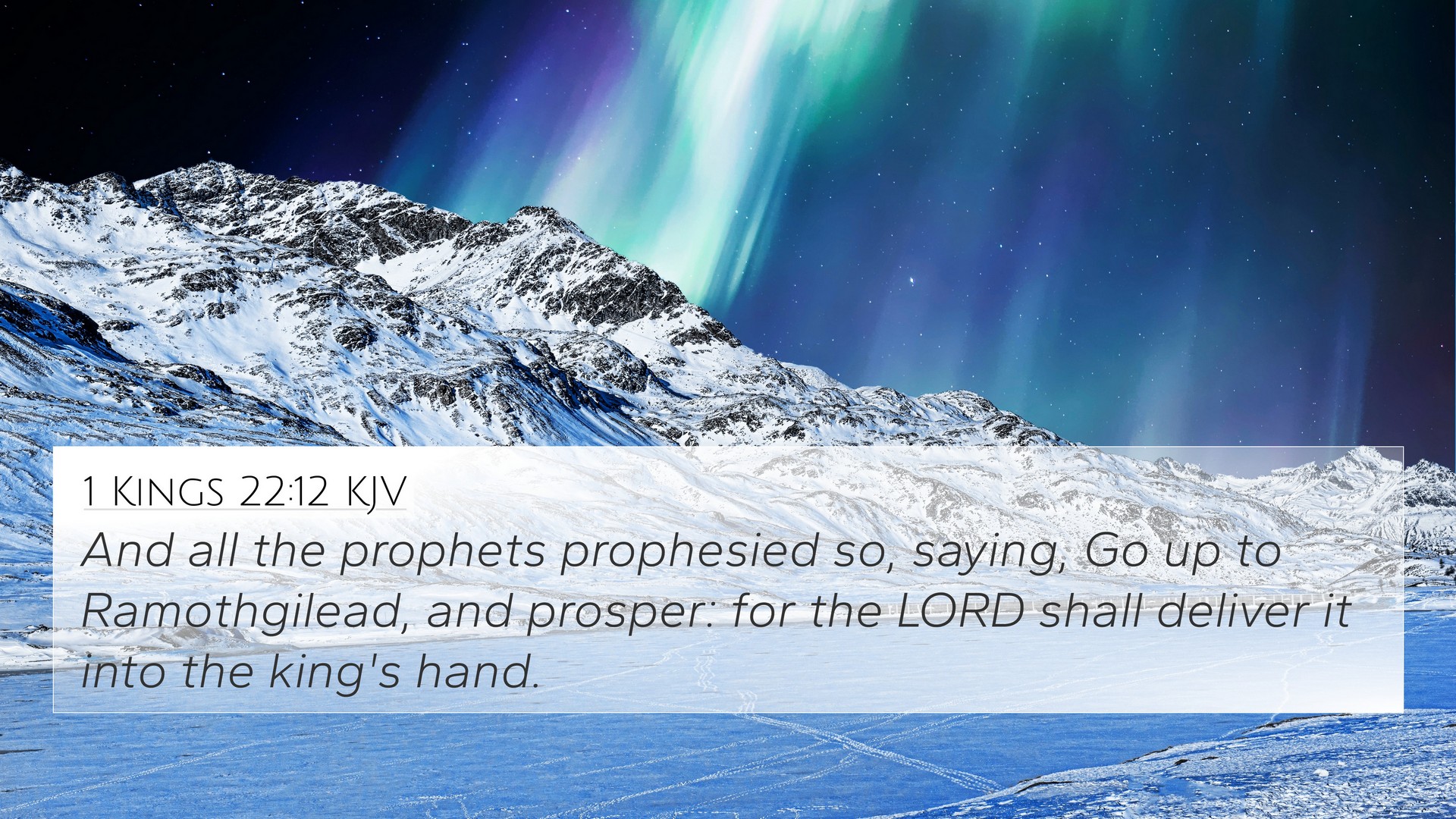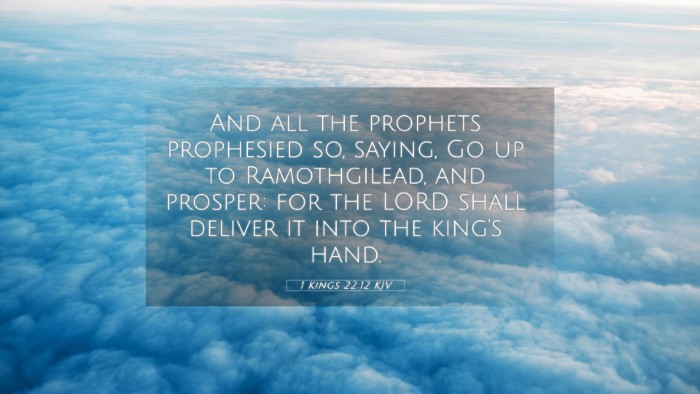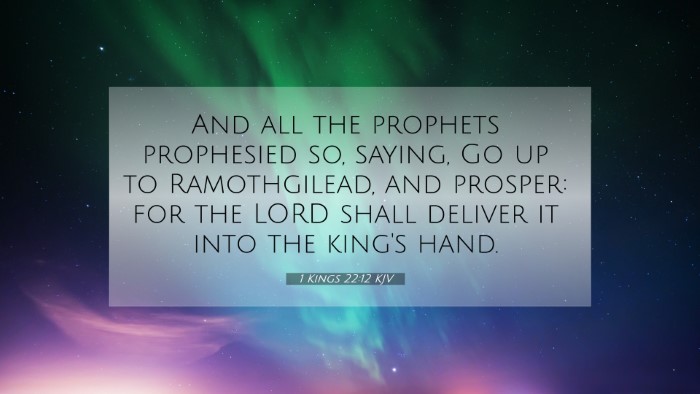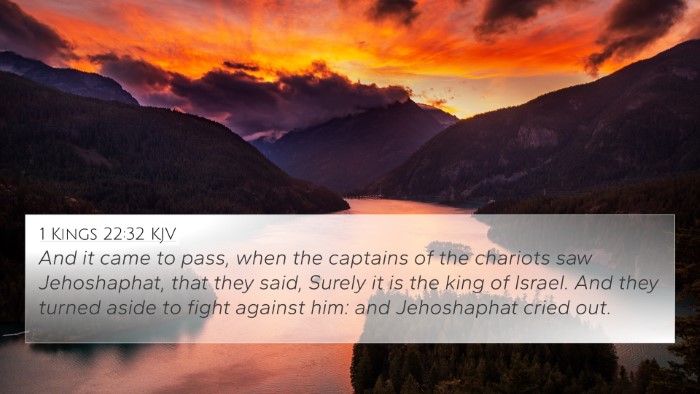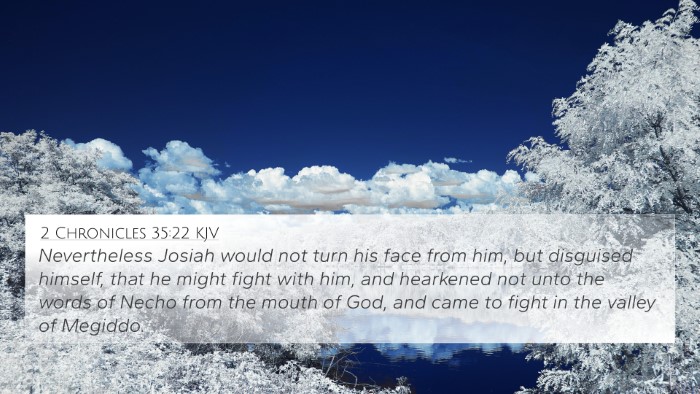Bible Verse: 1 Kings 22:12
This verse states, "And all the prophets prophesied so, saying, Go up to Ramoth-gilead and prosper: for the Lord shall deliver it into the king's hand."
The context of this verse is pivotal to understand the dynamics of prophetic declarations and the nature of true prophecy in the narrative of Israel's monarchy. The prophet Micaiah contrasts sharply with the other prophets, revealing the dangers of conformity to popular prophetic voices rather than seeking the true word of God.
Meaning and Interpretation:
-
Prophetic Consensus: The verse showcases a united front among the prophets, who speak a favorable message to King Ahab. Matthew Henry suggests that this reflects the common tendency of false prophets to please leaders rather than to proclaim divine truth.
-
False Security: Albert Barnes comments on the assurance given by these prophets, indicating a typical scenario where prophetic voices echo the desires of those in power, leading to disastrous consequences for the leaders and the people they govern.
-
The Role of True Prophecy: Adam Clarke highlights the necessity of discerning true versus false prophecy. Micaiah's later condemnation of Ahab (not covered in this verse but crucial to the narrative) serves as a reminder that divine truth often stands in stark opposition to popular opinion.
-
Consequences of Disobedience: The verse foreshadows the ensuing battle and Ahab's downfall, establishing a theme of obedience to God's commands as central to the success of the monarchy. This idea resonates with other scriptural texts that connect obedience with divine favor.
-
Theological Implications: The declaration of the prophets reflects a misunderstanding of God’s will. This speaks to the nature of divine sovereignty and the extent to which God allows human agency, a concept that can also be explored through texts like Romans 1:18-25, wherein God's truth is exchanged for a lie.
-
Loyalty and Manipulation: The collective agreement among the prophets, as described in this verse, reveals the dynamics of loyalty and manipulation that often accompany leadership. Commentaries note that this reflects a broader truth about human relationships and the complexities of power.
-
Context of Conflict: The setting of 1 Kings 22 takes place during a time of conflict, and the call to arms by the prophets encapsulates a significant moment in Israel's history. This historical lens invites cross-references with other texts that discuss the role of prophecy in warfare such as Jeremiah 20:10.
Related Bible Cross-References:
- Jeremiah 23:16: Warning against the false prophets who lead the people astray.
- Micah 3:5: A condemnation of those who prophesy for financial gain.
- Ezekiel 13:1-3: A critique of false prophets who proclaim peace while the sword is coming.
- 2 Chronicles 18:12-16: A parallel account of Micaiah confronting Ahab.
- 1 Samuel 28:6: Saul seeking counsel from a medium shows the desperation resulting from turning away from God.
- Matthew 7:15: Jesus warns against false prophets who come in sheep's clothing.
- Acts 20:29-30: Paul warns the Ephesian elders about false teachers arising from among them.
Thematic Connections:
-
This verse ties into a larger theme of Bible verses that relate to each other, exploring the intersection of prophecy and obedience across scripture.
-
The interaction between prophets and kings found in this text can be analyzed with other instances of cross-referencing Biblical texts, such as in the books of the Prophets.
-
Consider grouping with similar themes in Comparative Bible verse analysis, where God’s revelation often clashes with human expectation.
Conclusion:
The exploration of 1 Kings 22:12 through these commentaries highlights essential themes of prophecy, the search for truth, and the dynamics of power. Understanding the implications of this verse provides a foundational view of the challenges faced by God's people in seeking His will amidst conflicting voices. Through careful cross-referencing, readers can see deeper connections that enrich the understanding of biblical texts and illuminate the intertwining stories of faith and prophecy throughout scripture.
